This chapter focuses on the relationship between parents and their young adult children, from the parents’ perspective. For many of the questions, parents were asked to think of a specific child ages 18 to 34. This way they could give more concrete answers rather than trying to generalize about all of their children (if they have more than one child in that age group).
Among the key findings:
- Most parents give their relationship with their adult children high ratings, with 77% saying it’s excellent or very good. A majority also say they think their adult children know them extremely or very well, beyond their role as a parent.
- 41% of parents say their children rely on them a great deal or a fair amount for emotional support. Only 18% of parents say they rely as heavily on their children for emotional support. These patterns differ significantly by the gender of the parent and child.
- Most parents say their young adult children come to them for advice at least sometimes on a range of topics – from their career to their dating life. Relatively small shares report frequent disagreements with their children across a variety of topics.
- Parents are in close contact with their young adult children: 73% say they text with them and 54% say they talk on the phone or video chat at least a few times a week. Parents are largely satisfied with how often they communicate with their kids and with their overall level of involvement in their lives.
How parents rate their relationship with their young adult children
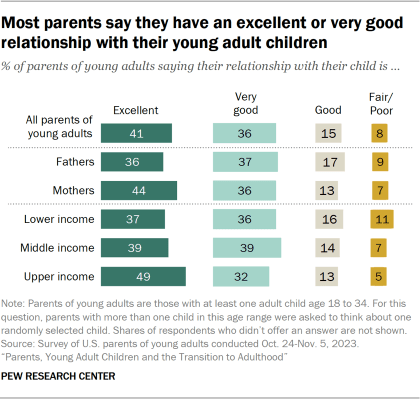
Overall, parents rate their relationship with their young adult child positively: 41% describe it as excellent and another 36% say it’s very good; 15% say it’s good and only 8% say it’s fair or poor.
Mothers are somewhat more likely than fathers to say their relationship with their adult child is excellent (44% vs. 36%). And upper-income parents are more likely to say this than parents with middle or lower incomes.
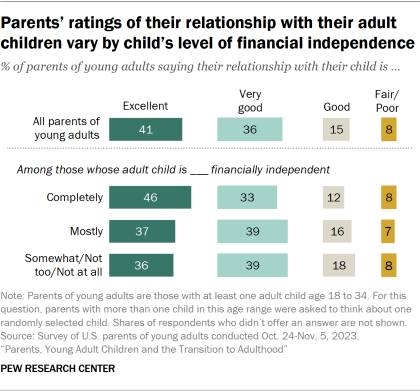
The ratings also vary to some degree by the child’s circumstances. Nearly half (46%) of parents who say their child is completely financially independent say their relationship with that child is excellent. Among parents who say their child is not this financially independent, the shares are lower.
Do parents think their adult children truly know them?
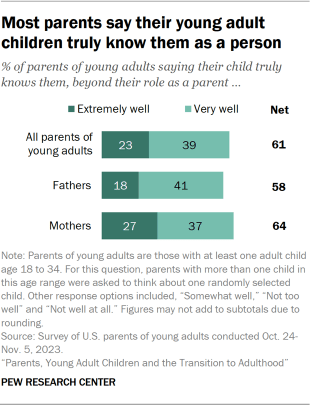
We also asked parents how well they think their child truly knows them beyond their role as a parent.
Most parents say their child knows them extremely (23%) or very well (39%). Some 30% say their child knows them somewhat well, and 9% say their child doesn’t know them too well or at all.
Again, there are differences between mothers and fathers. While majorities of both groups say their child knows them at least very well, moms are more likely than dads to say their child knows them extremely well (27% vs. 18%).
Moms answering about a daughter are more likely to say their child knows them extremely well compared with moms answering about a son (31% vs. 23%). Dads’ responses don’t differ depending on the gender of the child.
Emotional support, according to parents
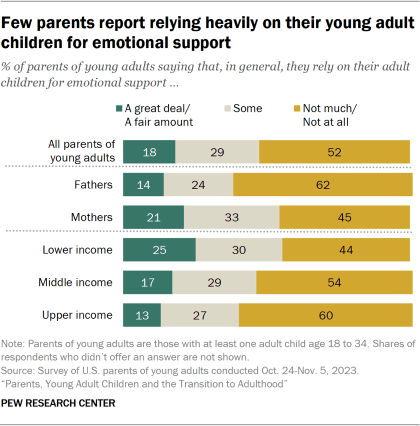
Relatively few parents say they rely heavily on their adult children for emotional support. About one-in-five (18%) say they rely on any of their adult children for this type of support a great deal or a fair amount. About three-in-ten parents (29%) say they rely on their children some for emotional support, while about half (52%) say they don’t rely on them much or at all.
Fathers are significantly more likely than mothers to say they don’t rely on their adult children for emotional support: 62% of dads say they don’t rely on them much or not at all, compared with 45% of moms.
There are differences by income as well: 60% of upper-income parents say they don’t rely on their adult children for this type of support, compared with 54% of parents with middle incomes and 44% of those with lower incomes.
What parents say about how much their adult children rely on them for emotional support
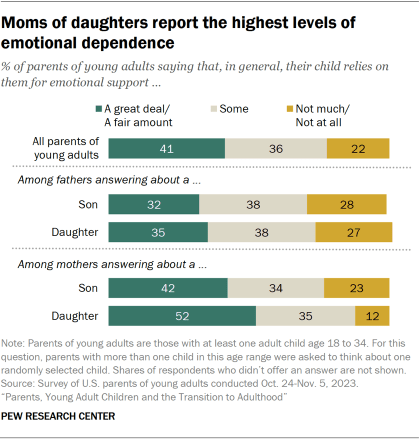
When asked about a specific child, about four-in-ten parents say that child relies on them a great deal (15%) or a fair amount (26%) for emotional support. An additional 36% say their child relies on them some, 18% say not much and 5% say not at all.
Moms are more likely than dads to say their child relies on them a great deal or a fair amount for emotional support (47% vs. 34%). Moms answering about a daughter (52%) are more likely than those answering about a son (42%) to say their child relies on them for emotional support. Among dads, the responses don’t differ based on the gender of the child.
Parents who are answering about a child age 18 to 24 are more likely than those answering about a child in their early 30s to say their child relies heavily on them for this type of support (46% vs. 36%).
Not surprisingly, the nature of the relationship between a parent and an adult child is also linked with emotional reliance. Among parents who say their relationship with their child is excellent or very good, 47% also say their child relies on them at least a fair amount for emotional support.
By contrast, parents who give their relationship with their child a lower rating are less likely to report this: 22% among those who rate their relationship as good and 15% for those who say it’s fair or poor.
Giving advice to young adult children
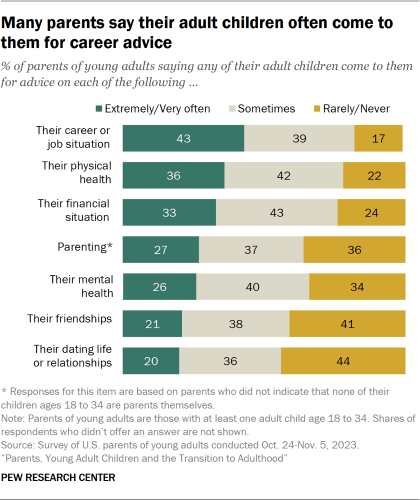
Beyond emotional support, we also asked parents how often any of their adult children come to them for advice on a variety of things.
Career guidance tops the list: 43% of parents say their adult children come to them for advice on their career or job situation extremely or very often, and another 39% say they do this sometimes.
Some 36% say their children often come to them for advice on their physical health, and a similar share say their kids often seek advice on their financial situation (33%).
About one-in-four (27%) say their young adult children often come to them for advice on parenting (among those who have children who are parents themselves).
A similar share (26%) say their children often come to them for advice on their mental health. Smaller shares say their kids often look to them for guidance on their friendships (21%) or their dating life or relationships (20%).
There are differences here between mothers and fathers, with mothers more likely to say their adult children come to them for advice on each topic. For example, 47% of moms and 38% of dads say their children often come to them for advice on their career or job situation. About a third of moms (34%) say their kids come to them for advice about their mental health, compared with 16% of dads.
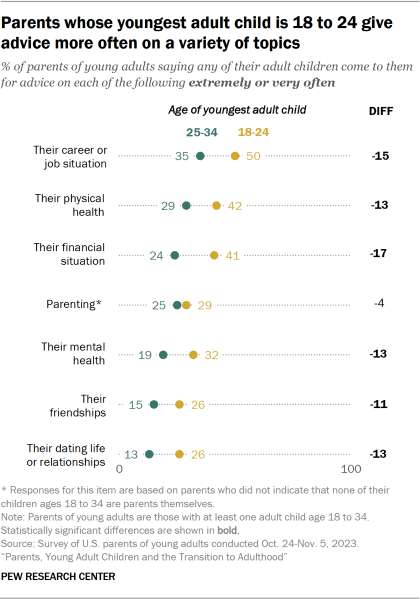
Giving advice is much more common for parents with at least one adult child age 18 to 24. Among those whose youngest adult child is under 25, 50% say their children often ask them for job or career advice. This compares with 35% among parents whose youngest adult child is 25 or older.
Similarly, 42% of parents with a child age 18 to 24 say their children often ask them for advice on their physical health. Some 29% of parents whose youngest adult child is 25 or older say the same. The pattern is similar across all the items, with the exception of parenting (where the 4-percentage-point difference is not statistically significant).
Did today’s parents rely on their own parents for advice when they were young?
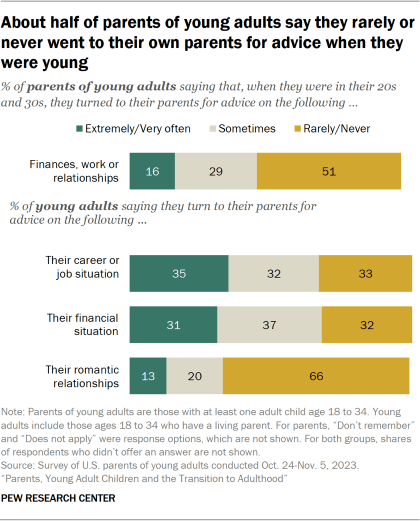
The survey also asked parents about their own experiences when they were young adults. Although the questions weren’t exactly the same, parents’ responses suggest that they may have been less reliant on their parents for advice than their own children are on them.
Only 16% of parents say that, when they were in their 20s and 30s, they turned to their parents for advice on finances, work or relationships extremely or very often. About three-in-ten (29%) say they sometimes did this. And 51% say they rarely or never asked their parents for advice on these types of things.
Parents’ disagreements with their young adult children
Relatively few parents report that they often clash with their adult children about various aspects of their lives, with just 14% or fewer saying this happens extremely or very often.
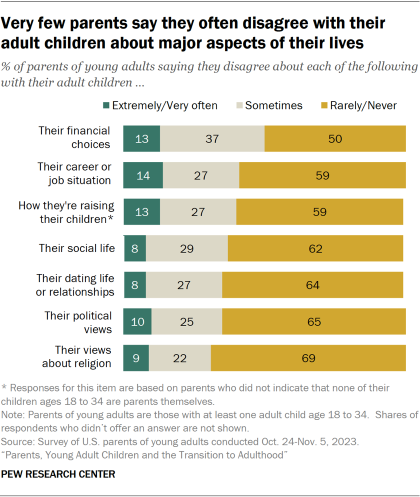
Half say they disagree with their children about their financial choices at least sometimes. And about four-in-ten (41%) say they disagree with their children about their career or job situation.
Smaller shares say they often or sometimes disagree with their children about their social life (37%), their political views (35%) or their views on religion (30%).
Among parents whose young adult children have kids of their own, 40% say they disagree with them at least sometimes about how they’re raising their children.
Parents whose youngest adult child is 25 or older are more likely than those with a child age 18 to 24 to say they rarely or never disagree about their children’s finances or social and dating lives.
One word of caution in interpreting these results: According to respondent feedback, some parents may have been thinking about outward disagreements only and not taking into account times where they may silently disagree with their adult children’s choices.
How often parents are in touch with their young adult children
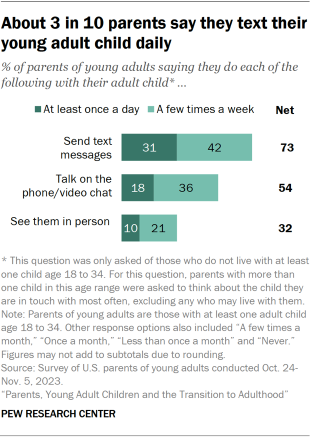
We asked parents a series of questions that touched on the nature and frequency of their communications with their adult children.
For these questions, we asked parents with more than one young adult child to think about the child they are in touch with most often. We also limited these questions to parents and children who don’t live together.
We found that many parents are in frequent contact with their young adult children. About three-in-ten (31%) say they are in touch with them through text messages on a daily basis, and an additional 42% say they text with them a few times a week.
Parents see their adult children in person less frequently: 10% say they see them daily and 21% say it’s a few times a week.
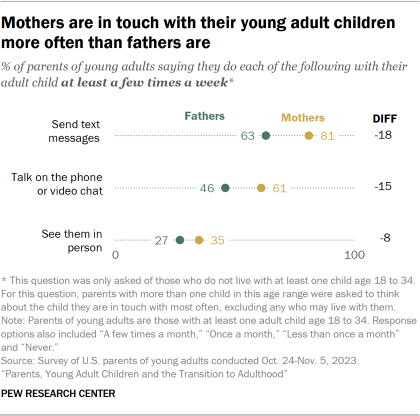
There are large differences between mothers and fathers in how often they’re in contact with their adult children. Moms are much more likely than dads to say they text with or talk on the phone with their child on the phone at least a few times a week.
Four-in-ten moms say they text with their adult child every day, compared with 19% of dads.
Tracking young adult children’s location
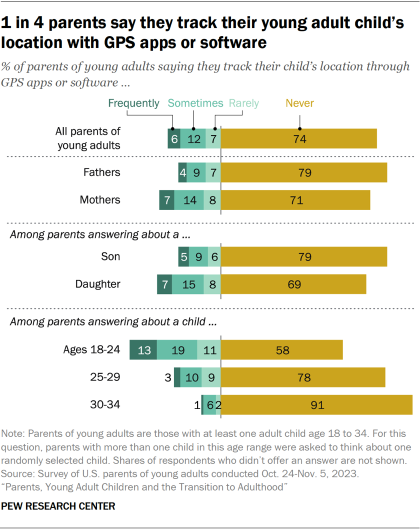
When asked whether they ever track their adult child’s location through GPS apps or software, most parents (74%) say they do not.
Still, one-in-four say they do – even if only rarely: 6% say they do this frequently, 12% say they sometimes do this, and 7% say they rarely do.
There are gender differences among parents and adult children. Mothers are more likely than fathers to say they ever do this kind of tracking (29% vs. 21%). And parents are more likely to say they track their daughters than their sons (31% vs. 21%).
There are also differences by the age of the adult child. Most of the tracking is being done of 18- to 24-year-olds. Among parents answering about a child age 18 to 24, 42% say they track their location. A smaller share (21%) of parents answering about a child age 25 to 29 say they do this. And the share is smaller still for parents answering about a child in their early 30s (9%).
What parents think about their level of communication and involvement in their adult children’s lives
For the most part, parents are content with how often they’re in touch with their adult children. When asked about a specific adult child, 59% say they communicate with that child about as often as they’d like. Even so, a not insignificant share – 36% – say they communicate with their child less often than they’d like. Only 3% say they communicate with them more than they’d like.
Mothers express higher levels of satisfaction than fathers do: 65% of moms, compared with 52% of dads, say they communicate with their adult child about as often as they’d like. For their part, dads are more likely than moms to say they communicate less than they’d like (44% vs. 30%).
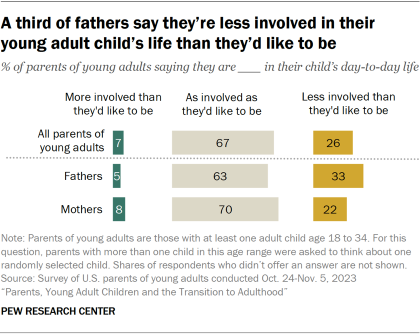
Thinking more broadly about their overall involvement in their adult children’s day-to-day lives, most parents (67%) say they’re about as involved as they like to be. About one-in-four (26%) say they’re less involved than they’d like to be, and 7% say they’re more involved than they’d like.
The gender patterns are similar here, with mothers more likely than fathers to say they’re as involved as they’d like to be (70% vs. 63%) and fathers more likely than mothers to say they’re less involved than they’d like to be (33% vs. 22%).




